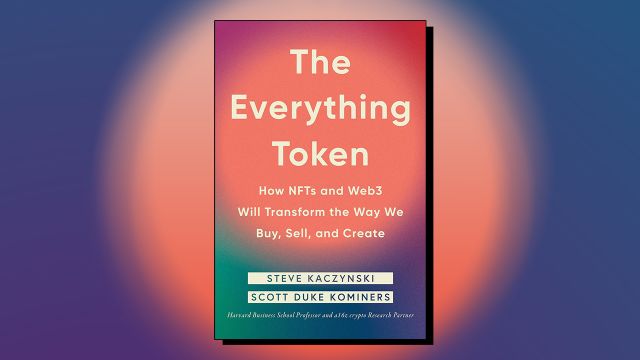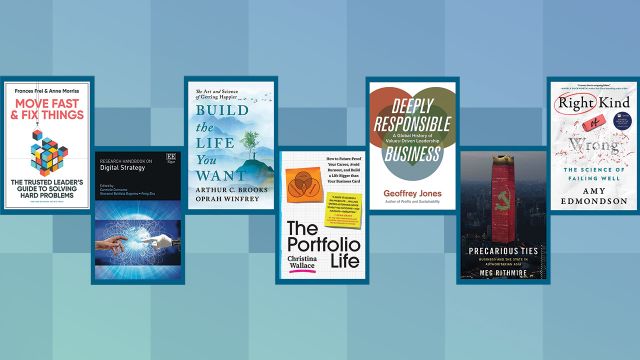
Struggling With a Big Management Decision? Start by Asking What Really Matters
by Dina Gerdeman
- 15 Apr 2024
- |
- Book

Beyond Goals: David Beckham's Playbook for Mobilizing Star Talent
- 29 FEB 2024
- |
- HBS Case
Reach soccer's pinnacle. Become a global brand. Buy a team. Sign Lionel Messi. David Beckham makes success look as easy as his epic free kicks. But leveraging world-class talent takes discipline and deft decision-making, as case studies by Anita Elberse reveal. What could other businesses learn from his ascent?

What Will It Take to Confront the Invisible Mental Health Crisis in Business?
- 09 NOV 2023
- |
- HBS Case
The pressure to do more, to be more, is fueling its own silent epidemic. Lauren Cohen discusses the common misperceptions that get in the way of supporting employees' well-being, drawing on case studies about people who have been deeply affected by mental illness.

Did You Hear What I Said? How to Listen Better
- 06 NOV 2023
- |
- Research & Ideas
People who seem like they're paying attention often aren't—even when they're smiling and nodding toward the speaker. Research by Alison Wood Brooks, Hanne Collins, and colleagues reveals just how prone the mind is to wandering, and sheds light on ways to stay tuned in to the conversation.

From P.T. Barnum to Mary Kay: Lessons From 5 Leaders Who Changed the World
- 24 OCT 2023
- |
- HBS Case
What do Steve Jobs and Sarah Breedlove have in common? Through a series of case studies, Robert Simons explores the unique qualities of visionary leaders and what today's managers can learn from their journeys.

How Humans Outshine AI in Adapting to Change
- 26 MAR 2024
- |
- Research & Ideas
Could artificial intelligence systems eventually perform surgeries or fly planes? First, AI will have to learn to navigate shifting conditions as well as people do. Julian De Freitas and colleagues pit humans against machines in a video game to study AI's current limits and mine insights for the real world.

Open Source Software: The $9 Trillion Resource Companies Take for Granted
- 22 MAR 2024
- |
- Research & Ideas
Many companies build their businesses on open source software, code that would cost firms $8.8 trillion to create from scratch if it weren't freely available. Research by Frank Nagle and colleagues puts a value on an economic necessity that will require investment to meet demand.

Harnessing AI: What Businesses Need to Know in ChatGPT’s Second Year
- 09 JAN 2024
- |
- In Practice
Companies across industries rushed to adopt ChatGPT last year, seeing its potential to streamline tasks formerly handled by people and vendors at much higher cost. As generative AI enters its next phase in 2024, what can leaders expect? Harvard Business School faculty members highlight four trends to watch.

When Tech Platforms Identify Black-Owned Businesses, White Customers Buy
- 24 OCT 2023
- |
- Research & Ideas
Demand for Black-owned restaurants rises when they're easier to find on Yelp. Research by Michael Luca shows how companies can mobilize their own technology to advance racial equity.

Why Boeing’s Problems with the 737 MAX Began More Than 25 Years Ago
- 24 JAN 2024
- |
- Op-Ed
Aggressive cost cutting and rocky leadership changes have eroded the culture at Boeing, a company once admired for its engineering rigor, says Bill George. What will it take to repair the reputational damage wrought by years of crises involving its 737 MAX?

How Gender Stereotypes Kill a Woman’s Self-Confidence
- 25 FEB 2019
- |
- Research & Ideas
Researchers believe gender stereotypes hold women back in the workplace. Katherine Coffman's research adds a new twist: They can even cause women to question their own abilities.

What's Enough to Make Us Happy?
- 02 APR 2024
- |
- What Do You Think?
Experts say happiness is often derived by a combination of good health, financial wellbeing, and solid relationships with family and friends. But are we forgetting to take stock of whether we have enough of these things? asks James Heskett.

Why Work Rituals Bring Teams Together and Create More Meaning
- 09 APR 2024
- |
- Book
From weekly lunch dates with colleagues to bedtime stories with children, we often rely on rituals to relax and bond with others. While it may feel awkward to introduce teambuilding rituals in the workplace, the truth is, the practices improve performance, says Michael Norton in his book The Ritual Effect.

Struggling With a Big Management Decision? Start by Asking What Really Matters
- 15 APR 2024
- |
- Book
Leaders must face hard choices, from cutting a budget to adopting a strategy to grow. To make the right call, they should start by following their own “true moral compass,” says Joseph Badaracco.

Why Work Rituals Bring Teams Together and Create More Meaning
- 09 APR 2024
- |
- Book
From weekly lunch dates with colleagues to bedtime stories with children, we often rely on rituals to relax and bond with others. While it may feel awkward to introduce teambuilding rituals in the workplace, the truth is, the practices improve performance, says Michael Norton in his book The Ritual Effect.

More Than Memes: NFTs Could Be the Next Gen Deed for a Digital World
- 23 JAN 2024
- |
- Book
Non-fungible tokens might seem like a fad approach to selling memes, but the concept could help companies open new markets and build communities. Scott Duke Kominers and Steve Kaczynski go beyond the NFT hype in their book, The Everything Token.

HBS Faculty Books of 2023: Find Happiness, Fix Things, and Fail Well
- 12 DEC 2023
- |
- Book
From authoritarian regimes to social responsibility, we take a look back at some of the new books by Harvard Business School faculty members this year.
Sign up for our weekly newsletter
Interested in improving your business? Learn about fresh research and ideas from Harvard
Business School faculty.
This site is protected by reCAPTCHA and the Google
Privacy Policy and
Terms of Service apply.


